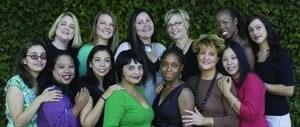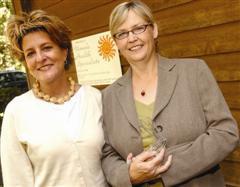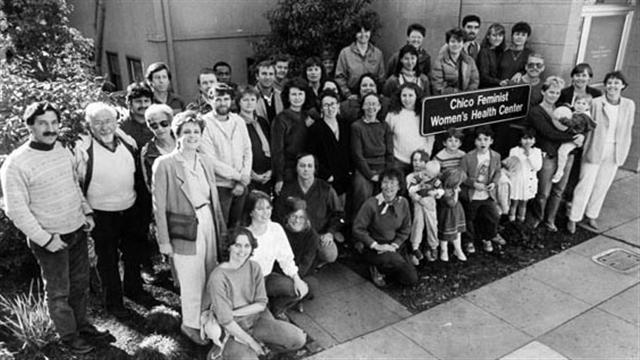A Brief History Of Women's Health Specialists
Featured in the September 15, 2006 issue of Chico News and Review
by Lauren Evans, Chico News and Review Reporter
For our historic timeline, visit here.
FOR WOMEN, BY WOMEN
Much has changed and much has stayed the same since the Feminist Women’s Health Center started 30 years ago. It was 1971, and a group of women sat in a circle performing pelvic exams on themselves.They were curious, determined and fiercely feminist. A group of speculum-passing "hippies” may sound odd, but to the women who founded the Feminist Women’s Health Center it was serious business. Deadly serious.
Roe v. Wade had yet to give women abortion rights, and the desperate were dying in alleyways and shady facilities. Men dominated the gynecological field and few women took an active role in their own health care.
“A group of speculum-passing “hippies” may sound odd, but to the women who founded the Feminist Women’s Health Center it was serious business. Deadly serious.”
For the group of women who used a mirror, flashlight and speculum to gain knowledge, it signified the grass-roots beginning of a national movement not only for women’s health, but for the idea that women should be in control of their own bodies. The next step for the sisterhood was to share this knowledge with other women. Carol Downer and a colleague named Lorraine Rothman started an abortion referral service in Los Angeles, and in 1973, when the Supreme Court legalized abortion, they joined a group of women in opening the first Feminist Women’s Health Center there. From there, the movement grew as supporters traveled to Los Angeles, and later, Oakland, to train for months and then start clinics in other cities including, in 1975, the private, non profit Chico Feminist Women’s Health Center.
"It was their sheer dedication and willingness to work for nothing that got the clinic off the ground,” said Shauna Heckert, the center’s executive director. The hours were long and the pay was miniscule, if anything. "The first person to get paid was the person answering the phone.”
This year, the Chico clinic, now called Women’s Health Specialists, also celebrates 30 years helping women understand their bodies, obtain birth control and get safer abortions.
MAKING IT RIGHT
Helping launch the Chico Feminist Women’s Health Center in 1975 were, from left: Betty Szudy, Dido Hasper, Wendi Jones, Judy Rutherford and Janice Turrini. Founders not pictured are Helen Jones, Gayle Sweigert, Nancy Oaks and Gayla Nicholson. Photo courtesy of FWHC.
A lot has changed in three decades. The Chico clinic first opened at 330 Flume St., moved more than once, and is now located at 1469 Humboldt Road. Since then, countless women have passed through its doors, collectively helping to alter the way women’s bodies are viewed in a medical environment. Heckert refers to the last 30 years as a long series of opportunities and challenges. There have been anti-abortion protests and arsons. There have been death threats. In July 2004, staffers and volunteers mourned the death of Dido Hasper, one of the Chico women who founded the clinic and someone Heckert calls "an icon of the women’s movement and the community.”Heckert said, "First and foremost the celebration is that we’re still here.”
Speculum-passing has been replaced by a full-fledge legitimate medical practice, but the mission remains the same: helping women help themselves. "Women cannot be free if someone else is controlling their lives and their reproduction, ” Heckert said. "When you’re fighting for the liberation of women, you’re fighting for the liberation of all people.” A lot has changed in three decades. The Chico clinic first opened at 330 Flume St., moved more than once, and is now located at 1469 Humboldt Road. Since then, countless women have passed through its doors, collectively helping to alter the way women’s bodies are viewed in a medical environment.

Helping launch the Chico Feminist Women’s Health Center in 1975 were, from left: Betty Szudy, Dido Hasper, Wendi Jones, Judy Rutherford and Janice Turrini. Founders not pictured are Helen Jones, Gayle Sweigert, Nancy Oaks and Gayla Nicholson. Photo courtesy of FWHC.
“Speculum-passing has been replaced by a full-fledge legitimate medical practice, but the mission remains the same: helping women help themselves.”
Prior to the existence of the Feminist Women’s Health Center, if a woman in the Chico area had certain questions about her body, it necessitated a trip to the Bay Area, said Eileen Schnitger, development director for the clinic. "There was no place to get information about women’s bodies; there was no over-the-counter pregnancy test, no birth control availability, no abortion services,” Schnitger said. Even after abortions became legal, doctors shirked from the job, not wanting to wrap themselves up in what was largely considered a shameful practice.
"This was not a situation where all of a sudden abortion became legal and all of a sudden a million doctors went, ‘Oh, I’m going to provide abortions,’” Heckert said.
Anti-abortion activists have repeatedly targeted the Chico clinic, making it a hot bed of political, religious and social controversy."To firebombs to clinic invasion to being evicted, you name it--we’ve run the gamut. But every day in the last 30 years we have provided services in our building no matter what,” Heckert said. The federal government didn’t do much to help, treating each clinic arson as an isolated event, making investigation impossible. "It was really difficult to have doctors coming to our training programs and for clinics across the country during the years when abortion clinic terrorism was being supported by the federal government through President Reagan and Bush Senior,” Schnitger said. There was not much of an anti-abortion movement when the centers began, but in the 1980s, when the Republican Party adopted an anti-abortion platform, it really took off. Center leaders secured restraining orders against protestors and started a "clinic escort” program to protect clients from harassment.
TAKE A STAND

Supporters gather outside the FWHC’s offices on Flume Street. Photo By Mark Thalman.
“We weathered all these storms, because what we were doing was right and safe and good, and women kept coming to us no matter what,””
When an arson fire tore through the Redding clinic in 1990, clients traveled Chico for services. Two years later, an anti-abortionist posing as a patient let loose butyric acid in the basement, causing a noxious smell and forcing an evacuation. Those involved with Feminist Women’s Health Centers have found themselves also serving as lobbyists, fighting for causes as diverse as FDA approval of cervical caps, legal midwifery and health insurance contracts. (The clinic’s name was changed in 1996 to drop the feminist reference and "make the clinic more palatable to HMOs,”Heckert said."The established medical community saw the women’s health movement as a threat to them and were very offended that their practices, their beliefs, were being questioned, because they’d never been questioned before,” Heckert said. "They were coming at us like ...it was witchcraft or something." "We weathered all these storms, because what we were doing was right and safe and good, and women kept coming to us no matter what,” she said.
Despite appearances given by protestors and arsonists, surgical abortions are not the extent of the clinic’s services to the Chico area. More than anything, the aim of the Women’s Health Specialists is to educate women about their bodies and put them in the driver’s seat."We see women’s bodies as normal and healthy, and that women will always make the best health care decisions for themselves, if they have all the information,” Heckert said.
PROUD SISTERHOOD
The assumption that doctors should and do know everything is a thing of the past, a notion that was changed in part by the self-help efforts of the nine laywomen who started the first clinic in Los Angeles.
"They did self-exams together, and they learned so much about their own bodies; things that were never shared or even known by physicians about normal, healthy women, and that really inspired them to open their own clinic and provide the kind of health care they wanted to receive, that other women wanted to receive,” Schnitger said.

Staff members and volunteers celebrated the 30th anniversary of the clinics this year. Photo Courtesy Of FWHC.
Such women-run clinics began to spread across the country as more and more women took interest in what was generally considered a radical new approach to health care."We wanted to change the way the medical community treated women, women’s lives, and women’s reproduction,” Heckert said.
The clinics are part of a federation that has spread to other locations in cities including Redding, Sacramento and Santa Rosa, their doors always open to women who need help or just want information. They come to Women’s Health Specialists for annual pelvic exams, pap smears, treatment of sexually transmitted diseases, adoption services, various forms of birth control and emergency contraception. In 2000, the clinics were the first provider of the "abortion pill” in California.
It doesn’t matter to clinic staff if a woman seeking the morning-afterpill is diligent with birth control or chronically careless. "We will never criticize a woman for her birth control strategy,” Heckert said. In addition, men can come to the clinic for condoms, STD screenings, HIV tests and physical checkups.
YES, THAT’S A SPECULUM

Shauna Heckert, left, executive director of what is now called Women’s Health Specialists, joined the nonprofit in 1976. Development Director Eileen Schnitgerstarted at another location in 1977 and moved to Chico in 1983. Photo By Tom Angel.
At first glance the clinic looks just like a doctor’s office, but it is far from typical. This is exactly the type of atmosphere the clinic strives to achieve, Heckert said. "Our goal is to change those institutions so women leave their healthcare setting with more information that when they’d arrived, with more choices than when they’d arrived, and feeling positive about themselves and their bodies." In the last 30 years, the clinic’s supporters have managed to do just that. While they still struggle with people who don’t share their vision, the women agree that has never been a reason to quit.
"I think that the whole idea of the 30th anniversary is to learn from the history of the health center and understand its importance in today’s world.” Heckert said. "We look to the present and to the past and to the future. And I think that’s the strength of our organization. We’ve always looked forward while learning from our past.”

In 1984, staff members, volunteers and their families gathered around the Feminist Women Health Center’s first location at 330 Flume Street in downtown Chico. Photo courtesy of FWHC.